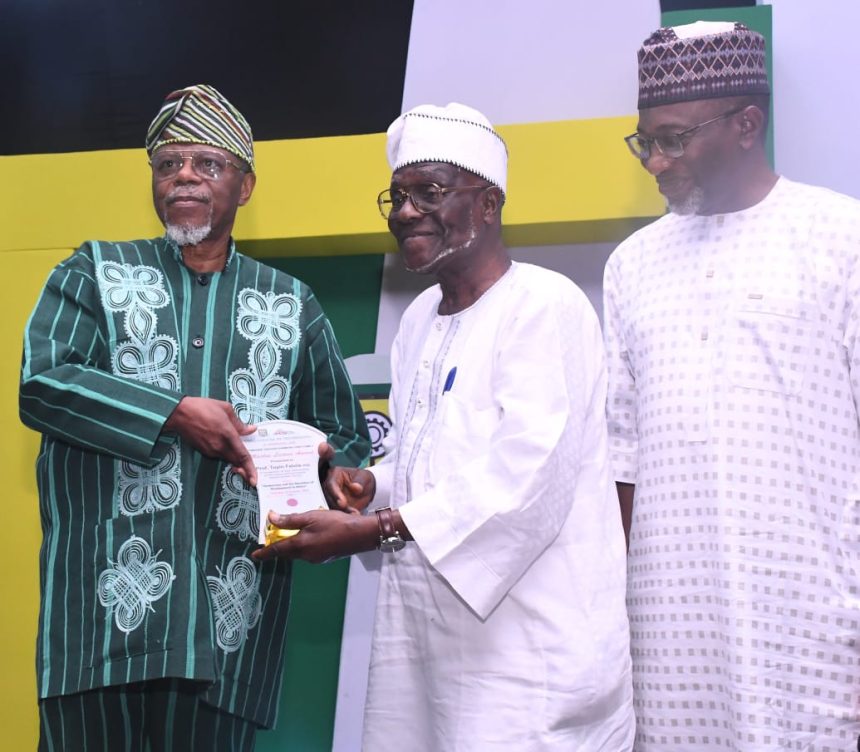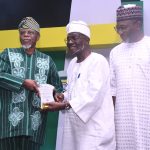…..Charts Path For Africa’s Democratic Renewal
The Yaba College of Technology (YABATECH),Lagos hosted the first and maiden lecture of the newly established Hassan Sunmonu Centre for Leadership and Governance (HS-CLG), with participants resolving to reposition leadership and democratic practice in Africa through inclusive institutions, ethical governance, and accountable leadership.
The event, which was held at the Yusuf Grillo Auditorium of the College, featured the inaugural lecture titled “Democracy and the Dynamics of Development in Africa”, delivered by the renowned Historian, Prof. Toyin Falola.
The lecture, according to the communiqué issued at the end of the programme, emphasized that democracy in Africa can only drive sustainable development when it is anchored on inclusive institutions, credible elections, active citizen participation, and democratic control over coercive power.
In the communiqué, participants affirmed that the establishment of the HS-CLG was not only to honour the pioneering labour leader, Comrade Hassan Sunmonu, but also to build an enduring institution that would combine values with competence and promote evidence-based leadership.
The gathering resolved to institutionalize the Centre as “Africa’s lighthouse for practice-anchored leadership,” serving as a hub where scholarship meets service and where democratic ideals are translated into measurable developmental outcomes.
According to the communiqué, the stakeholders also agreed to attract endowments, fellowships, and programme sponsorships that will strengthen the Centre’s sustainability and expand its reach. They noted that “great visions advance at the speed of commitment,” calling on public and private organizations to support the initiative.
The communiqué further stressed the need to mainstream transparency and accountability in governance. Participants advocated the adoption of international public sector accounting standards (IPSAS) and the enforcement of moral and financial integrity in public institutions. They described anti-corruption efforts as essential to development and democracy.
On electoral reforms, the communiqué called for elections that go beyond rituals to become credible exercises that confer legitimacy on governments and inspire citizen confidence. It emphasized that electoral integrity and institutional strengthening must remain at the heart of governance reforms.
The forum also highlighted the importance of youth inclusion in leadership, resolving to co-create youth fellowships, civic-technology laboratories, and policy clinics that would channel youth activism into policy innovation and service delivery. “The energy of youth movements such as #EndSARS and #FeesMustFall must be transformed into durable policy outcomes,” the communiqué stated.
Participants equally called for deliberate efforts to reduce ethnic and regional divisions in politics by promoting informed, performance-based voting and rewarding cross-group cooperation. They also encouraged partnerships with faith-based organizations to foster civic virtues, curb sectarian manipulation, and align moral authority with democratic accountability.
In addition, the communiqué advocated a balanced civil–military relationship, urging the professionalization of the security sector and strengthening of democratic oversight to prevent authoritarian tendencies.
Stakeholders also proposed a labour–industry–academy collaboration to design solutions that promote decent work, productivity, and social protection. They revealed that the Centre would soon establish “leadership laboratories” and “governance studios” to provide hands-on training and develop replicable models of governance innovation.
To ensure sustainability, the communiqué announced plans to organize an Annual Governance and Development Summit to review progress on elections, anti-corruption, youth inclusion, and institutional reforms. A public scorecard would be published yearly to track the impact of leadership and governance initiatives.
The communiqué concluded with a pledge by participants to uphold an ethic of accountability, innovation, and empathy in leadership. “We commit to leadership that protects the vulnerable, rewards innovation, and organizes solutions with evidence, empathy, and endurance — binding today’s pledges to tomorrow’s outcomes,” it stated.
With the launch of the Hassan Sunmonu Centre for Leadership and Governance, YABATECH has signalled its commitment to grooming a new generation of leaders dedicated to transforming democratic ideals into measurable progress across Africa.
The Rector, Engr. Dr. Ibraheem Abdul, in his welcome address at the maiden lecture and fund-raising programme of the Hassan Sunmonu Centre for Leadership and Governance (HS-CLG), described the event as “a defining moment for the institution and an inflection point for leadership development in Africa.”
He said the gathering was convened not only to honour a national icon, Comrade Hassan Sunmonu, but also to launch a vision that would nurture ethical, innovative, and service-driven leaders who could translate ideals into enduring impact.
According to him, the new Centre was conceived as “a lighthouse where values meet competence, where scholarship meets service, and where democratic ideals translate into measurable development outcomes.” He explained that the Centre would cultivate ethical leadership, incubate policy innovation, and model inclusive democracy, while connecting classroom learning to national transformation.
Dr. Abdul also noted that the fund-raising segment of the programme was not a mere ceremony, but “a rite of commitment” towards building a sustainable institution.
He urged participants and partners to invest in leadership laboratories, governance studios, policy clinics, and open resources that would extend the Centre’s impact beyond the College. “Each pledge plants a seed that will grow into leaders with character and competence, institutions with backbone and memory, and policies with evidence and empathy,” he stated.
He further charged students, faculty, alumni, and partners to see the Centre as a shared responsibility and an enduring legacy. To the students, he said the Centre would train them to think critically, act ethically, and collaborate across differences. For faculty and staff, he emphasized the need to produce scholarship that informs reform and shapes policy. He also called on labour, industry, and development partners to co-create solutions that address Africa’s pressing governance and development challenges.
In his address as Chairman of the occasion, the Member representing Surulere Federal Constituency I in the House of Representatives, Hon. Fuad Kayode Laguda, commended Yaba College of Technology for hosting what he described as “a symbolic and innovative programme” that seeks to redefine leadership and governance in Nigeria. He said the maiden lecture and fund-raising programme of the Hassan Sunmonu Centre for Leadership and Governance (HS-CLG) presented a timely opportunity to reflect on the importance of renewed leadership and strategic governance in achieving democratic stability and long-term national development.
Hon. Laguda paid glowing tribute to Comrade Hassan Adebayo Sunmonu, describing him as “a union leader who fought tirelessly to lay a sustainable foundation for true leadership and good governance through responsible unionism.” He noted that Comrade Sunmonu’s advocacy for justice, freedom, and equitable governance had inspired generations, urging Nigerians to emulate his values of discipline, honesty, and patriotism. According to him, “our country can only progress when we adopt habits, rules, and ethics that promote national cohesion, good citizenship, and renewed hope in Nigeria.”
The lawmaker also called on students, staff, and the public to participate in conversations that foster leadership transparency and accountability, emphasizing that the history of unionism in Nigeria had always been tied to positive social and political change.
He advised the Management of YabaTech to position the Centre among the most reputable think tanks in Africa, dedicated to transparent leadership and virtuous governance. “This Centre must create innovative programmes that strengthen democratic sustainability in our country,” he said.
Laguda further encouraged the Centre to invest in training, workshops, and seminars aimed at promoting inclusive development and deepening democratic consolidation. He reaffirmed his confidence that the HS-CLG would emerge as a strategic platform for advancing accountability, transparency, and integrity in Nigeria’s governance system.
“The survival of our nation depends on our shared sense of community, dialogue, and loyalty among stakeholders,” he remarked, adding that Yaba College of Technology must continue to serve as an academic agent for participatory governance and democratic legitimacy in Africa.
BV.










